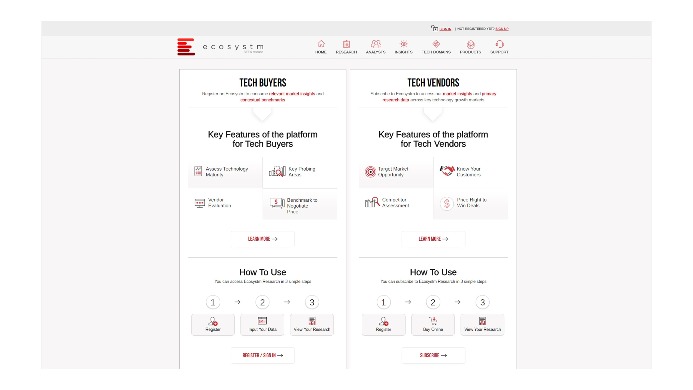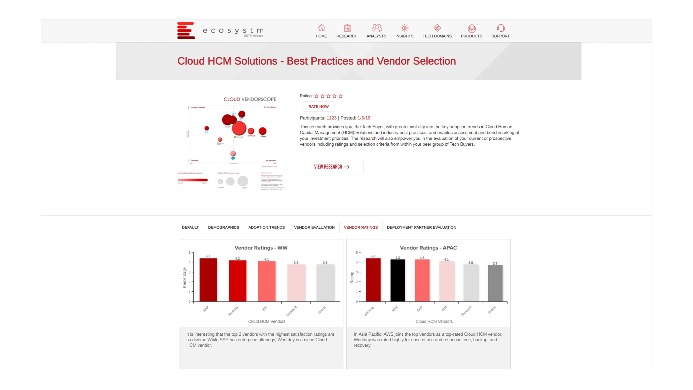Ecosystm is a platform for medium sized businesses to get the data they need without emptying the coffers for actionable data

Once a startup gets going, the job of a Founder is to wake up, make a bunch of decisions, go to bed, rinse and repeat.
But in making decisions, a lot of companies don’t have access to premiere data. Hamstrung by the reality of startup finances, the market data that corporate CEOs find essential is usually out of their reach.
Think of the Big Four auditing firms (Deloitte, EY, KPMG or PwC) — they have built global empires on their ability to provide CEOs with hyper in-depth actionable information.
They also are far to expensive for the SME.
A new startup in Singapore wants to change that. Called Ecosystm, the recently-launched company hopes that by building a “turn-the-knob” service for merchants, buyers and analysts they can build a, well, ecosystem that facilitates significantly more affordable market-data services.
“Who is helping the rest of them? The 95 per cent of the market, especially with technology being such a huge disrupter in any industry,” said Amit Gupta, the Founder and CEO of Ecosystm in a chat with e27.
“Amid all this disruption, you have this wave of emerging vendors coming in. Often these are companies that are not very mature, they don’t have deep pockets.”
Imagine a foreign company who may be looking to make an entrance into Southeast Asia. They can do their best to ask around, maybe read a few white papers and take a trip. But the high-level data — and expert analysis — can run anywhere from US$50,000 to US$100,000.
The problem exacerbates itself because while that is a serious chunk of change for a startup, it’s not enough spend to get anything besides scratch-the-surface information from the big consultancy firms.
Ecosystm thinks by democratising data and Uberising how analysts can support SMEs, they can build a product that can offer data for as low as a few hundred bucks. (Gupta was hesitant to make the “cliche” Uber comparison but laughed it off, citing the difficulty of finding another comparable idea).
The company has received funding from a family office firm and Gupta says the startup has a three-year runway to work towards its vision.
To clarify what Ecosystm offers, let’s break it down into the two core pillars.
Pillar One: The technology vendors and sellers

Pillar one is the pain-point — the technology companies who might rely on antiquated and expensive surveys to work around the fact that they can’t afford the Big Four.
It also is Ecosystm’s IP. Gupta wouldn’t give away the details of his trade secret, but he claims Ecosystm has developed a technology that would allow vendors to essentially gain access to real-time market data at a fraction of the price. Again, specific price was not revealed, but based on the conversation, an in-depth analysis of one country would cost a company in the low-four-digit range.
“It will take us time to get to the point, but the vision is to have enough data, that’s so robust in whatever markets we cover, that comes directly from the market. That allows vendors to be able to get a drill down into any market, by geography, by industry. Slicing dicing,” said Gupta.
Also Read: Exclusive: Yinglan Tan’s Insignia Ventures Partners invests US$600K into Vietnamese startup LOGIVAN
While surveys can be helpful, they can also become irrelevant by the time they get published.
Let’s take this week’s big story. If a company was planning a social media strategy in the United States, inevitably a survey would analyse how the country uses Facebook. And yet, if they had spent tens of thousands of dollars on commissioning the survey, all that information would be rendered pointless by the Cambridge Analytica scandal.
Once Ecosystm truly takes off, the hope is I could look at American social media marketing strategies today and see an update that prices-in the current Facebook debacle.
As with a lot of data-driven companies, the more people use Ecosystm, the better the information. That would then incentivise people to spend more time on the platform, creating a benevolent cycle.
Next, let’s take a look at the people who provide the add-value that will hopefully help Ecosystm distill and improve their data functions.
Pillar Two: The analysts

The analysts are the source of the Uberisation comparison.
A fairly typical part of becoming a professional analyst is the unfortunate reality that reaching an elite-level often results in trouble getting promoted. The biggest value an analyst provides to the firm is their expert knowledge — which often is the result of simply being around for a long time. A lot of companies are not going to give up that value to promote someone to the C-suite.
Often, analysts leave and try to start their own consultancy firm with mixed results. The issue is they need data to back up their findings, but without connection to the firm their access can be limited.
Ecosystm wants to help these types of people build up their businesses. The goal is to get them on the platform, provide them with their proprietary data and then the vendors choose from the pool of analysts to write a report.
“[Customers] look at our cloud infrastructure, see that is the guy in my region who is rated quite high. Maybe I want to chat with him?” said Gupta.
“They connect, talk, they get what they want, the analyst gets paid for that. We are giving the analysts a platform to build their own business.”
Much like how ride-hailing pitches the driver-partners as building their own little business, Ecosystm is trying to perform a similar task for analysts. Thus, the Uber comparison.
When asked about leakage — if a company likes an analyst, wouldn’t they just shift the relationship offline? — Gupta said that it’s not difficult to imagine this happening once or twice, but eventually the analyst will need access to the data. Plus, the rating system should benefit the honest actors.
“I think you have to start from the default stance [of assuming] people are honest. I think if someone rips people off, they will eventually drop off,” said Gupta.
“So [let’s say] an analyst does some work with our data and doesn’t tell us they have done some work. The thing is, where are they going to source the data? It might work one time, but customers need consistency. That ethics system still exists in the marketplace. Im not too worried about that”.
Also Read: [Podcast] The Story of You with Postr CEO Milan Reinartz
Moving forward, the startup wants to build the largest pool of on-demand analysts in the industry. If successful, they hope they are the only platform that provides in-depth analysis of markets that, at their price point, are often only superficially covered.
Also, ecosystm has plans to go global fairly quickly with the logic that it’s crucial to be able to provide information for practically any question. As the startup is young, this means building out APAC and making its first foray into the US fairly quickly.
If the idea that data is the new oil is true, Ecosystm one day hopes to be the gas station pump for SMEs across the world. They can visit the site, pay for however much, or little, they want and use the information to move forward with their business.
If it bears out, maybe we can think of the analysts as the gas station attendants selling those yummy candy bars and helping people with directions to the nearby tourist attraction.
—
The post If data is oil, Singapore startup Ecosystm plans to be the gas station for the tech industry appeared first on e27.